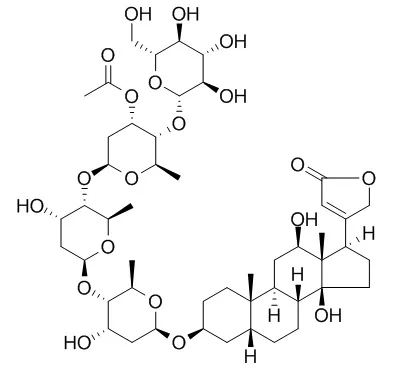| Description: |
Lanatoside C, a cardiac glycoside, possesses the ability to inhibit the interchange of Na and K across cell membrane and is widely used to treat anti-arrhythmias and heart failure. Lanatoside C can effectively inhibit all four serotypes of dengue virus, flavivirus Kunjin, alphavirus Chikungunya and Sindbis virus as well as the human enterovirus 71, suggest that lanatoside C possesses broad spectrum antiviral activity against several groups of positive-sense RNA viruses. |
| In vitro: |
| Sci Rep. 2017 Apr 7;7:46134. | | Lanatoside C, a cardiac glycoside, acts through protein kinase Cδ to cause apoptosis of human hepatocellular carcinoma cells.[Pubmed: 28387249 ] | Recent studies have revealed that cardiac glycosides, such as digitalis and digoxin, have anticancer activity and may serve as lead compounds for the development of cancer treatments.
The poor prognosis of hepatocellular carcinoma (HCC) patients reflects the development of resistance to current chemotherapeutic agents, highlighting the need for discovering new small-molecule therapeutics.
METHODS AND RESULTS:
Here, we found that Lanatoside C, an anti-arrhythmic agent extracted from Digitalis lanata, inhibited the growth of HCC cells and dramatically decreased tumor volume as well as delayed tumor growth without obvious body weight loss. Moreover, Lanatoside C triggered mitochondrial membrane potential (MMP) loss, activation of caspases and translocation of apoptosis-inducing factor (AIF) into the nucleus, which suggests that Lanatoside C induced apoptosis through both caspase-dependent and -independent pathways. Furthermore, we discovered that Lanatoside C activated protein kinase delta (PKCδ) via Thr505 phosphorylation and subsequent membrane translocation.
CONCLUSIONS:
Inhibition of PKCδ reversed Lanatoside C-induced MMP loss and apoptosis, confirming that Lanatoside C caused apoptosis through PKCδ activation. We also found that the AKT/mTOR pathway was negatively regulated by Lanatoside C through PKCδ activation.
In conclusion, we provide the first demonstration that the anticancer effects of Lanatoside C are mainly attributable to PKCδ activation. | | Antiviral Res. 2014 Nov;111:93-9 | | Antiviral activity of lanatoside C against dengue virus infection.[Pubmed: 25251726 ] | Dengue infection poses a serious threat globally due to its recent rapid spread and rise in incidence. Currently, there is no approved vaccine or effective antiviral drug for dengue virus infection.
In response to the urgent need for the development of an effective antiviral for dengue virus, the US Drug Collection library was screened in this study to identify compounds with anti-dengue activities.
METHODS AND RESULTS:
Lanatoside C, an FDA approved cardiac glycoside was identified as a candidate anti-dengue compound. Our data revealed that Lanatoside C has an IC50 of 0.19μM for dengue virus infection in HuH-7 cells. Dose-dependent reduction in dengue viral RNA and viral proteins synthesis were also observed upon treatment with increasing concentrations of Lanatoside C. Time of addition study indicated that Lanatoside C inhibits the early processes of the dengue virus replication cycle. Furthermore, Lanatoside C can effectively inhibit all four serotypes of dengue virus, flavivirus Kunjin, alphavirus Chikungunya and Sindbis virus as well as the human enterovirus 71.
CONCLUSIONS:
These findings suggest that Lanatoside C possesses broad spectrum antiviral activity against several groups of positive-sense RNA viruses. |
|






 Cell. 2018 Jan 11;172(1-2):249-261.e12. doi: 10.1016/j.cell.2017.12.019.IF=36.216(2019)
Cell. 2018 Jan 11;172(1-2):249-261.e12. doi: 10.1016/j.cell.2017.12.019.IF=36.216(2019) Cell Metab. 2020 Mar 3;31(3):534-548.e5. doi: 10.1016/j.cmet.2020.01.002.IF=22.415(2019)
Cell Metab. 2020 Mar 3;31(3):534-548.e5. doi: 10.1016/j.cmet.2020.01.002.IF=22.415(2019) Mol Cell. 2017 Nov 16;68(4):673-685.e6. doi: 10.1016/j.molcel.2017.10.022.IF=14.548(2019)
Mol Cell. 2017 Nov 16;68(4):673-685.e6. doi: 10.1016/j.molcel.2017.10.022.IF=14.548(2019)